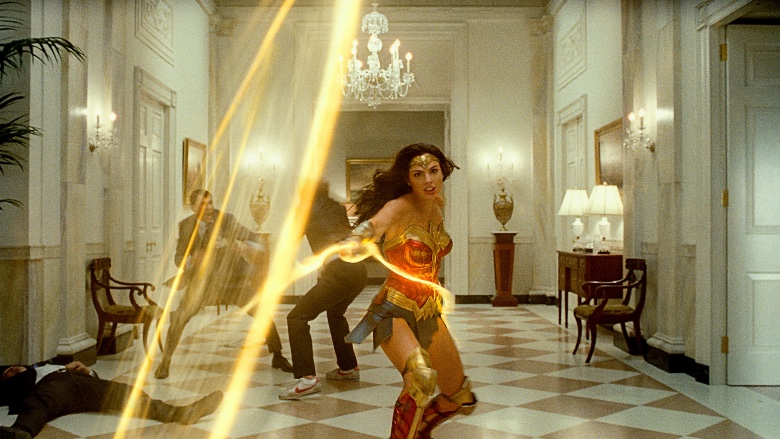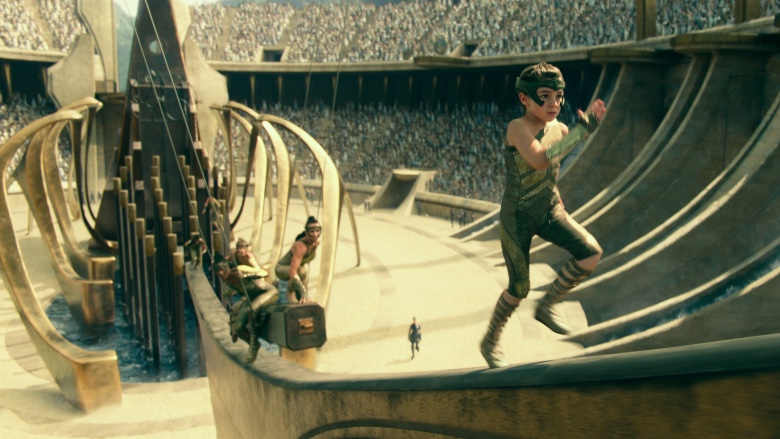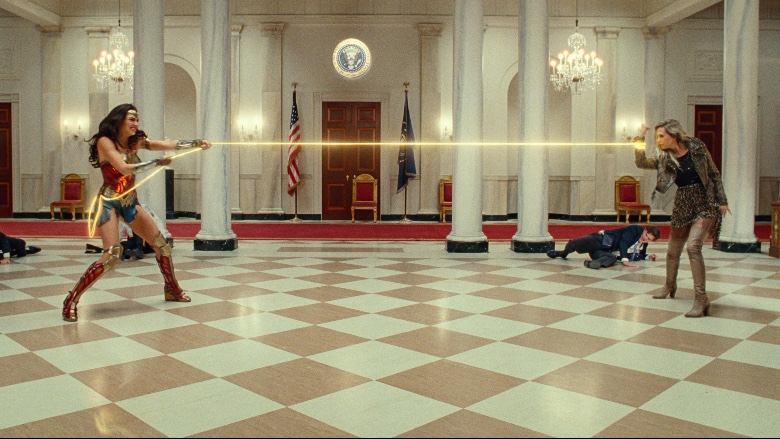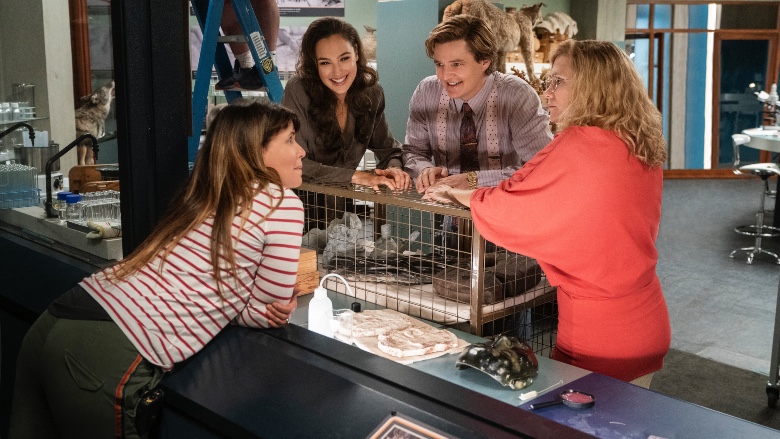
There is something infectiously charming about Gal Gadot as the beloved heroine Diana Prince. Perhaps it is her warm smile, her determined gaze, or the fact that she is clearly letting herself into the role.
As it turns out, this is about the only salvageable element of Wonder Woman 1984 (aka WW84), the highly-anticipated sequel to the popular 2017 Warner Bros. reboot. The rest of the film stumbles constantly upon itself, at times makes no sense, and does not even wow you with noteworthy visual effects or otherwise. Director Patty Jenkins rightfully wanted this film to be seen in theaters, but she and the franchise may be lucky that due to the pandemic, now it may not be viewed at all.
The sequel is set in 1984, as Diana still longs for the love of Steve Trevor (Chris Pine) while contending with a new duo of dangerous villains who threaten humanity. At its onset, Diana is remembering an experience from her childhood when she competed and (spoilers) nearly won a prestigious competition among the Amazon women, the god-like race from which she emerged. The lesson she has supposedly drawn from this experience is that taking shortcuts and not telling the truth are bad and staying on the path of righteousness is good. Fair enough, though this Augustinian analysis is just that—sophistry. There is nothing profound about this memory and its point never reemerges for the rest of the bulk two and a half hour timeline.

In the “present day,” Diana is now living as an anthropologist in the Smithsonian, some seventy years after the events of the first film. Diana should suffer quietly under the burden that comes from living lifetimes around humans who come and go and—somehow still after many decades—longs for the love of the pilot she met during World War I, with a burning passion that puts the Titanic protagonists to shame.
Diana befriends the frumpy Barbara Minerva (Kristen Wiig), a quiet, lonesome woman with apparently good intentions but that is supposed to secretly lust after Diana’s more confident, elevated stature. Meanwhile, a ruthless, Gordon Gekko-like business man, Maxwell Lord (Pedro Pascal) is in search of a stone (the “Dreamstone”) that he knows grants its holder one wish. It’s a Pandora’s box-like instrument though, created by Dolos, the god of mischief and treachery, and the granting of one’s desire comes at the expensive cost of losing that which is most valuable.
Lord gets his hands on the Dreamstone after seducing the hapless Minerva, and becomes the stone itself, granting wishes to all, big and small, President and pauper alike, leading the world to the brink of destruction in—what else—a nuclear Holocaust (it is the Cold War still, after all). Minerva and Diana, meanwhile, both unwittingly make wishes while holding the stone, with the former transforming into Cheetah (imbued with Wonder Woman type abilities) and the latter managing to revive the long-gone Trevor.

As straightforward as the above may seem, WW84 jumps schizophrenically from subplot to subplot, in a repeated series of misguided attempts to get the viewer’s emotional attention. Lord has a complicated relationship with his young child, Minerva is supposed to be sympathetic as an abused, mistreated woman, and Diana is supposed to be holding the baggage of her past. None of it works as the script meanders between these vignettes while finding excuses to show off its powerful visual effects.
But, those do not come either. Though Warner Bros. assembled an impressive team that includes John Moffatt (Harry Potter) as the VFX Supervisor, and crews from DNEG (led by Huw J. Evans), Framestore (Alex Waisbrot) and Method Studios (Aidan Fraser), none came up with anything exciting or original enough to be called stirring or exciting. Diana careens across the screen repeatedly with the aid of her trusty lasso—she even learns how to fly—but the sequences quickly feel stale and the one-on-one combat scenes are nothing like the striking original.
The best that can be said tech-wise for WW84 involves the upgraded score by Hans Zimmer and the ’80s costumes designed by Lindy Hemming. The former takes the exciting, drum-beat score original by Rupert Gregson-Williams and imbues it with a techy, 1980s type disco vibe, while providing his signature emotional sweeps for the climatic moments when Diana uses not her physical but her emotional powers to save the world. The latter designs a series of outfits that have all that 80s look without going over the top, falling into Madonna or Jane Fonda-themed stereotypes, and giving the picture an overall sense of realness that the story otherwise lacks.
You may be ready to entirely give up on WW84 until the third act, where Jenkins and her superstar Gadot redeem themselves. Though Diana’s use of selfless philosophy to rescue the world from the brink of self-destruction is at times illogical and perhaps even morally problematic (that the abused and exploited should accept their suffering fates because they are not alone in their misery), Gadot convinces you that her choice is the right one.

What Gadot brings to the screen, thanks in part to Jenkins’ clever understanding of the actress’ talent, is something no Marvel superhero save perhaps Tony Stark has ever managed to achieve—a true human side. As she navigates the challenge of choosing between Trevor and her duty, of trying to persuade selfish humans to give up the ghost of solipsism, it is Gadot as a human—not as Wonder Woman—that saves the day. Gadot shows true, heartfelt emotion, and a passion for what she is saying that equal few other actors who have taken on the task of embodying a superhero. Gadot’s grace and talent jump starkly out of the screen as not only the world, but her movie itself, is self-destructing. The heart-pounding countdown moments as Lord is prepared to end the world contrast well enough with this powerful sequence anchored by Gadot’s humanity. If nothing else, you will root convincingly for the character, perhaps the most likable of all the current superheroes in cinematic cadres.
Wonder Woman 1984 has placed itself squarely in the center of the ongoing debate about the future of film and theaters in the midst of social distancing and health precautionary measures. Patty Jenkins has made it no secret that—like many but not all of us—she believes these movies deserve the full cinematic experience. It is too bad, then, that the craft-related reasons for asking people to go to the cineplex are almost wholly absent from these proceedings. It is really seeing Gadot use all of her talents—physical and unseen ones—to save the world that makes the price of admission worth your while.
Wonder Woman 1984 will be in theaters nationwide and on HBO Max, starting on Christmas Day, December 25.
All photos courtesy of Warner Bros. Pictures.





